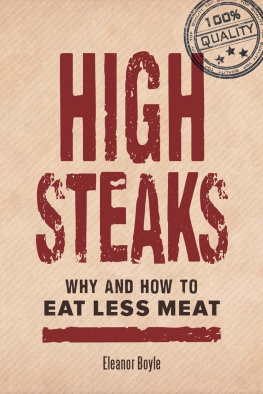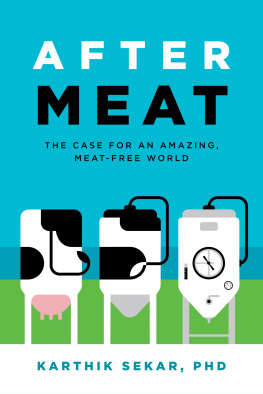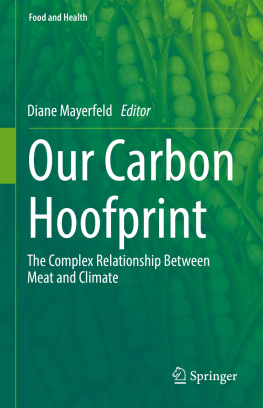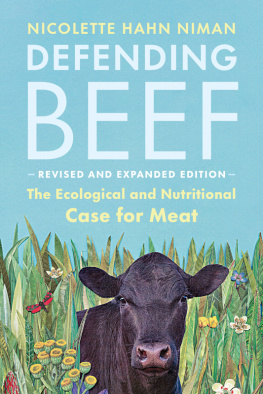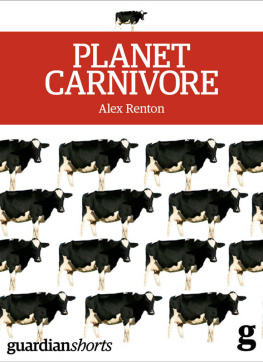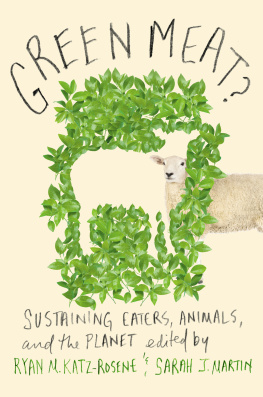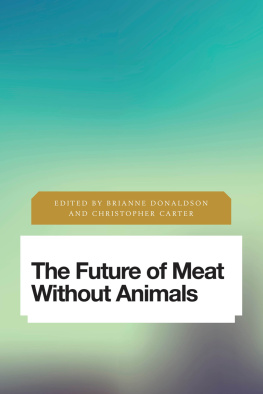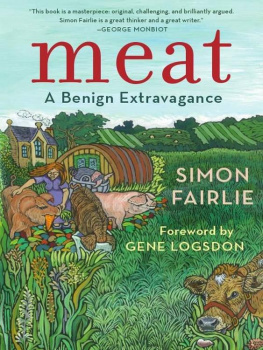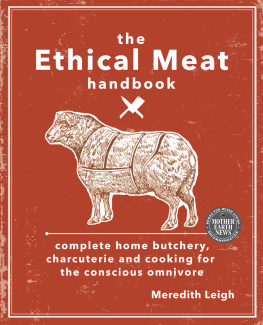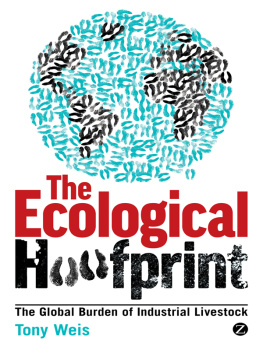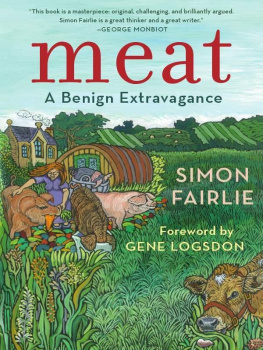Praise for High Steaks
Although all life is exquisitely interconnected by air, water and soil, we have shattered that world through the way we perceive it in bits and pieces, so we fail to recognize that our lifestyle has repercussions that reverberate through the biosphere. Industrial agriculture creates food by converting the energy in oil rather than directly from sunlight into plants. Eleanor Boyles timely book, High Steaks, reconnects our fragmented view to reveal the ecological, social, health and economic costs of a diet rich in meat. This is a vital book for all concerned about the perilous state of our planet and anxious for ways to live that are healthy for ourselves and the biosphere.
David Suzuki, scientist, environmentalist and author
This is a very important book it addresses a key component of our climate troubles, and it does it by addressing people where they actually are, and offering some realistic, attractive, and compelling options for changing deep-rooted habits.
Bill McKibben, author
Eaarth: Making a Life on a Tough New Planet
The list of mainstream meat productions negative impacts is long: health, climate change, land use, feedstock, water, pharmaceutical misuse, biodiversity. A better course can and is being charted. This must engage all of us.
Tim Lang, Professor of Food Policy,
City University London
In some future century, humanity will either become comfortable with eating meat or will quit eating meat. For now, as Eleanor Boyle explains in her well-researched and well-written book, our individual health and the sustainability of our society depend on rejecting industrial agriculture, which includes eating less meat. Boyle gives us dozens of good reasons to eat more responsibly and sustainably.
John Ikerd, Author, Speaker, and
Professor Emeritus of Agricultural Economics,
University of Missouri, Columbia.
For years we have been encouraged to eat more meat than what is good for us and the planet. Eleanor Boyle presents reasonable and compelling arguments for moving meat from the centre of our plates to the side. Whether you care about your familys health, our environment, how farm animals are treated or all of the above, this book is an essential read. This isnt another doom and gloom book. Instead it shows how we can all be part of the solution and achieve a more humane and sustainable food system. After reading Eleanor Boyles book, it is hard to imagine who wouldnt support a food system that is healthier for society, gentler on the planet and kinder to animals. She presents reasonable and compelling evidence to demonstrate that our current meat consumption levels are not sustainable as well as recipes for change. By changing our food policies and a few meals a week, we can all be part of the solution and improve our health, the environment and animal welfare.
Melissa Matlow, Campaigns Manager,
Humane and Sustainable Agriculture
World Society for the Protection of Animals (WSPA) Canada
A thorough, encompassing, and refreshingly balanced analysis of what it means to eat meat. The author provides compelling evidence that meat, and specifically that which evolves from high density confinement feeding systems, affects the health and welfare of people, communities, livestock and the broader environment. Rigorous citation of recent refereed literature makes this a must-read text for those seeking the latest, scientific understanding of many contentious issues. Articulate, comfortable, and readable prose ensures that the critical content of this book is accessible to a wide range of readers.
E. Ann Clark, Associate Professor (retired)
Plant Agriculture, University of Guelph
HIGH
STEAKS
WHY AND HOW TO
EAT LESS MEAT
Eleanor Boyle

Copyright 2012 by Boyle & Associates Sustainable Food Education Ltd.
All rights reserved.
Cover design by Diane McIntosh.
Background image, iStock (bopshops); Illustration iStock (Oehoeboero)
First printing July 2012.
New Society Publishers acknowledges the support of the Government of Canada through the Book Publishing Industry Development Program (BPIDP) for our publishing activities.
eISBN: 978-1-55092-499-2
Inquiries regarding requests to reprint all or part of High Steaks should be addressed to New Society Publishers at the address below.
To order directly from the publishers, please call toll-free (North America) 1-800-567-6772, or order online at www.newsociety.com
Any other inquiries can be directed by mail to:
New Society Publishers
P.O. Box 189, Gabriola Island, BC VOR 1X0, Canada
(250) 247-9737
LIBRARY AND ARCHIVES CANADA CATALOGUING IN PUBLICATION
Boyle, Eleanor, 1953
High steaks : why and how to eat less meat / Eleanor Boyle.
Includes index.
1. Livestock Ecology. 2. Animal industry Environmental aspects. 3. Animal culture. 4. Food of animal origin Health aspects. 5. Animals Food. I. Title.
SF140.E25B69 2012338.1'76C2012-903959-4
New Society Publishers mission is to publish books that contribute in fundamental ways to building an ecologically sustainable and just society, and to do so with the least possible impact on the environment, in a manner that models this vision. We are committed to doing this not just through education, but through action. The interior pages of our bound books are printed on Forest Stewardship Council-registered acid-free paper that is 100% post-consumer recycled (100% old growth forest-free), processed chlorine free, and printed with vegetable-based, low-VOC inks, with covers produced using FSC-registered stock. New Society also works to reduce its carbon footprint, and purchases carbon offsets based on an annual audit to ensure a carbon neutral footprint. For further information, or to browse our full list of books and purchase securely, visit our website at: www.newsociety.com

Contents
Appendix I: Whats to Eat?
Tips and Recipes for Cutting the Meat
If it takes a village to raise a child, as the proverb says, it also takes a community to write a book. Thank you to researchers who first recognized and raised these issues and, during my research, to the many individuals who went out of their way to share their time and expertise. People who hosted me and hiked, drove, or flew me around their countryside included: in rural Ontario, Colleen Ross; in Lethbridge, Cheryl Bradley and Ann Baran and others; in Winnipeg, Glen Koroluk and Patrick Krawek; in North Carolina, Larry Baldwin, Rick Dove, Dennis Howard, and Joanne Somerday, John Klecker, Kelsey Hansen, Marty Lawrence, and Diane Baldwin. In southern Alberta, Francis and Bonnie Gardner and their daughter Sarah, and neighbor Gordon Cartwright, enriched my understanding. In upstate New York, thanks to Adele and Jim Hayes, and Shannon Hayes, for educating me and for hosting photographer Seth Joel.
People who consented to be interviewed included Hans Schreier, JoAnn Burkholder, Cathy Holtslander, Mike Williams, Mark Mattson, Don Webb, Elsie Herring, Naeema Muhammed, Gary Grant, Hannah Connor, E. Ann Clark, Fred Tait, Basia Romanowicz, and Conner Ingram. Eva Pip welcomed me to her lab and educated me on water quality. Rod MacRae provided me with historical context and an overview of policy. A warm thank you to chef Annie Somerville, who made time to take part and who inspired me with her excitement about good food. Industry experts who helped me understand producers viewpoints included Mike Teillet, Dennis Treacy, Amy Richards, and Stewart Paulson.

